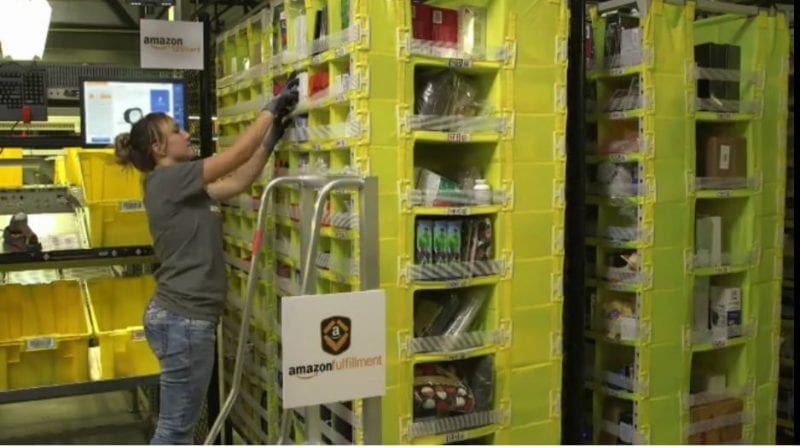On Tuesday morning, Amazon announced it will raise its minimum wage for all its employees in the United States to $15 an hour. The wage hike includes full-time, part-time and seasonal employees, as well as people who are working at Whole Foods and those hired via temp agencies. The increase is effective November 1, and employees who already make $15 an hour will also receive raises. The company employs more than 250,000 people in this country alone.
“We listened to our critics, thought hard about what we wanted to do, and decided we want to lead,” Amazon founder and CEO Jeff Bezos said in a press release.
In April, The New Food Economy published a story in partnership with The Intercept that showed Amazon employees were relying on Supplemental Nutrition Assistance Program (SNAP, formerly food stamps) benefits to feed themselves at disproportionately high rates. That same week, Amazon revealed that its median employee made just $28,446 a year. Citing the story’s findings, Senator Bernie Sanders, the Independent from Vermont, introduced a piece of legislation in September that would force large companies to compensate for their employees’ reliance on federal assistance, dubbing it the “BEZOS Act.”
The company’s wage hike announcement falls about a month after Sanders announced his bill.
“There’s a market dynamic that has necessitated Amazon paying higher wages.”
Amazon has long maintained that its full-time fulfillment center employees make an average of $15 an hour, including bonuses and stock incentives. However, an advertisement for full-time associates in West Columbia, South Carolina accessed Tuesday afternoon displayed a $12-an-hour starting wage. In Arizona, where we reported that one in three Amazon employees relies on SNAP to buy groceries, the company was offering wages as low as $11.25 in the hours following its announcement.For hourly employees affected by the pay increase, the difference between earning what the company has long said is average pay and actually earning it is likely to be substantial. At the same time, the move may help address the concerns of employees elsewhere in Amazon’s workforce—specifically, the Whole Foods workers spearheading a unionization effort at store locations nationwide.
Amazon, a notorious leader in miserly pay may have finaly heard the message from increasingly militant workers. But the problem is systemic and this may be just the first skirmishes in what is liable to be a very long global labor war.
With Tuesday’s announcement, Amazon joins a cadre of large corporations that have recently announced commitments to raising wages companywide.
Target employees, for example, will make a base minimum wage of $15 by 2020, Walmart employees now earn a minimum of $11, up from the federal minimum of $7.25 an hour, and Costco pays all of its employees a minimum of $14 an hour, according to The New York Times.

For families who rely on SNAP (Supplemental Nutrition Assistance Program), government support is critical.
“My sense of this decision is that there’s a market dynamic that has necessitated Amazon paying higher wages,” says Stacy Mitchell, director of the Community-Scaled Economy Initiative at the Institute for Local Self-Reliance, a community development advocacy group. She adds that Amazon is gearing up for the holidays, and according to its press release, will hire as many as 100,000 seasonal employees—at a time when the country’s unemployment rate hovers around 4 percent. Those economic dynamics, combined with recent political scrutiny, meant that Amazon was going to have to raise wages sooner or later—why not make a loud announcement and enjoy a day of fawning press?
Given its history, Amazon is an unlikely advocate to join the likes of the Fight for $15.
Mitchell also points out that the political calculus at play may be influenced by an existential fear of antitrust enforcement. By raising wages, the company buys itself some goodwill with politicians and workers alike—and potentially staves off the threat of public intervention, at least for a while. “It’s an old playbook,” Mitchell adds. “Back in the early 1940s, when [A&P, a large grocery store chain] was under increased scrutiny for their market power, they cut a deal with the union and the farm groups that supplied them.”In an apparent 180-degree turn, Amazon also announced on Tuesday that it will start lobbying for an increase in the $7.25 federal minimum wage. Given its history, Amazon is an unlikely advocate to join the likes of the Fight for $15. But when the company puts its full weight behind something, it will be hard for industry and government not to listen. We’ll see if major players are quick to follow Amazon’s lead, or whether federal regulators will eventually force them to.
When asked about whether stepping into the federal policy fray had long been part of the company’s strategic plans (it seems a significant development), Amazon’s PR manager for public policy told The New Food Economy in an email that “our public policy team will work with policymakers here in DC to advocate for a higher federal minimum wage. We believe $7.25 is too low, but we would look to Congress to decide the parameters of a new, higher federal minimum wage.”
All this underscores another point: As Amazon grows in size, influence, and ambition, it’s likely to begin a second career in Washington, D.C.—both as a business leader working to enshrine new national standards, and as a kind of uber-lobbyist looking out for its own interests in the corridors of power.
By raising wages, the company buys itself some goodwill with politicians and workers alike.
As an employer with a large domestic workforce, Amazon is now too big to fly under the radar on key issues like wages and benefits. Tuesday’s concession is the beginning of a new conversation that isn’t going away—one looks beyond Amazon’s technological advancements, and asks what it owes the communities it lives in. At the same time, Amazon’s big plans for the future of supply chains, retail, and home delivery can only thrive within an amenable legal structure. It will need laws that support the next-generation business models it dreams up, whether it’s giant floating delivery warehouses, physical stores based on online reviews, or autonomous fulfillment center robots. Whether or not Amazon decides to plant its much-anticipated second headquarters in the nation’s capital, as signs suggest it will, one thing is for certain: This is a company increasingly fixated on, and working to shape, federal policy. The wage increase isn’t Amazon’s first bold move with political implications in Washington and beyond. It definitely won’t be the last.
Addendum
Amazon is a pioneer in using robots—thereby eliminating workers, unless they are employed building more robots, a self-cancelling situation under capitalist rules of income distribution.
15,000 amazon kiva robots drives eighth generation fulfillment center from designboom on Vimeo.
 In his zeal to prove to his antagonists in the War Party that he is as bloodthirsty as their champion, Hillary Clinton, and more manly than Barack Obama, Trump seems to have gone “play-crazy” — acting like an unpredictable maniac in order to terrorize the Russians into forcing some kind of dramatic concessions from their Syrian allies, or risk Armageddon.However, the “play-crazy” gambit can only work when the leader is, in real life, a disciplined and intelligent actor, who knows precisely what actual boundaries must not be crossed. That ain’t Donald Trump — a pitifully shallow and ill-disciplined man, emotionally handicapped by obscene privilege and cognitively crippled by white American chauvinism. By pushing Trump into a corner and demanding that he display his most bellicose self, or be ceaselessly mocked as a “puppet” and minion of Russia, a lesser power, the War Party and its media and clandestine services have created a perfect storm of mayhem that may consume us all.— Glen Ford, Editor in Chief, Black Agenda Report
In his zeal to prove to his antagonists in the War Party that he is as bloodthirsty as their champion, Hillary Clinton, and more manly than Barack Obama, Trump seems to have gone “play-crazy” — acting like an unpredictable maniac in order to terrorize the Russians into forcing some kind of dramatic concessions from their Syrian allies, or risk Armageddon.However, the “play-crazy” gambit can only work when the leader is, in real life, a disciplined and intelligent actor, who knows precisely what actual boundaries must not be crossed. That ain’t Donald Trump — a pitifully shallow and ill-disciplined man, emotionally handicapped by obscene privilege and cognitively crippled by white American chauvinism. By pushing Trump into a corner and demanding that he display his most bellicose self, or be ceaselessly mocked as a “puppet” and minion of Russia, a lesser power, the War Party and its media and clandestine services have created a perfect storm of mayhem that may consume us all.— Glen Ford, Editor in Chief, Black Agenda Report 




